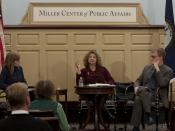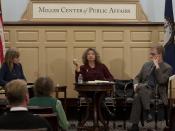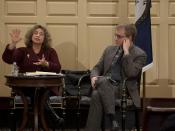Pluralism and the ruling elite are two different schools of thought that have developed distinct theories about the state. The pluralist base their theory on the ideology that if a specific criterion is matched in a country, the political system could be claimed to be pluralist. Although the criteria mentioned here is very complex, hence I will not go into detail. The criteria is based on the pluralism existence ideology summarised on page 11 of The Democracy by Faith Maria. This criteria is further illustrated on page 22 when the writer writes about the old soviet union politics and when he makes references to the present UK and US governments. Pluralist ideas oppose any form of tyranny, and the way they propose to avoid tyranny is for there to be social pluralism and 'the seven institutional features'. I will not go into detail about the seven institutional features, but they generally are there to allow pluralism to flourish, and to ensure everyone has minimum power
Faith Maria has extender her research in political pluralist theory and has concluded that the pluralism distribituonal of power exists In societies which are developed and have sufficient Human Rights regulalation, this is cited by arguments in her article which was published in 1980 'The absolute power'
I fully agree with Faith Maria's claims that pluralism is the closest any society can get to classical liberalism
The application of power behaves very differently in a pluralist model.
According to the pluralist, power is not concentrated in any single group or any single political party such as described in the example above. The assumption is that there is a wide variety of conflicting interest between societies and that all groups and individuals have minimum political influence. The theory states that when the mass have different opinions,


